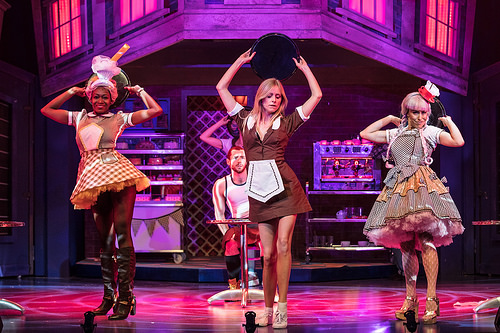The recent Nick Broomfield documentary on Whitney Houston was a reminder of how similar Whitney was to 60s star Dusty Springfield. Both struggled with difficult relationships with men, substance abuse, fading youth, bisexuality and being forced into performing pop rather than soul. A stage musical using Dusty’s backlist to tell her story could have been an R&B Traviata. But that’s not what we get here.
Three disparate characters are inconceivably (and unconvincingly) drawn to the site of an old record shop in Soho called the Preacher Man. The owner, back in the 60s, was a kind of guru who helped lovelorn teenagers sort themselves out. The three pilgrims find the shop is now a coffee bar and discover not the owner (long dead) but his son – hence son of a preacher man. This was the title of Dusty’s best hit from her best album Dusty in Memphis. Although not certain he can help, the son (Ian Reddington) is charged with abetting the three searchers with their “modern” romance issues. And to keep things light and frothy there’s the coffeeshop’s waitresses, the Cappuccino Sisters, in silly outfits.
Kat (usually X-Factor semi-finalist Diana Vickers but on the Edinburgh opening night Jess Barker takes the role) is trying to find a mate online; Paul (Michael Howe) is an older gay man seeking the guy he first met in the record shop 50 years ago; and Alison (Debra Stephenson) a suburban EngLit tutor who’s fallen for her 17-year-old student. The action is interspersed by choice items from the Dusty songbook. Might things have been better had the setting been the Deep South (no, not Bromley)?
There is no reason why this scrawny storyline shouldn’t work as a musical. But the songs are horribly square pegged into the plot. Nowhere to Run sees our three principles well, er, running. Dusty sang a variety of composers’ songs from Burt Bacharach to Carole King and it was her performances that often gave the music extra meaning. She was a star because she imbued the songs with a special power – not for nothing was she called “the blue-eyed soul singer”. But in this stage version her yearning pop ballads are too often given a backstory of aching banality. It’s as if the production – its story and through-line – were worked out by committee. The galumphing book by Warner Brown doesn’t help. Too many disparate elements elbow each other and often just fail to gel. Director/choreographer Craig Revel Horwood seems helpless to tighten things up. Even the dance routines seem confused with one person cutting off another in ugly overlapping manoeuvres. At a speed-dating event three singletons dance with empty stacking-chairs singing I Just Don’t Know What to Do with Myself which comes over a bit like Sally Bowles at the dentist.
Yet there is some great singing and wonderful harmonies. The three main performers (especially Barker and clear-voiced Stephenson) do what they can and the stage musicians perform well. But can someone please tell that trumpeter to pipe down. From now until July 2018 no part of the UK is to be spared this touring show. Can things improve? As Dusty would have it, here’s “wishin’ and hopin’”.
